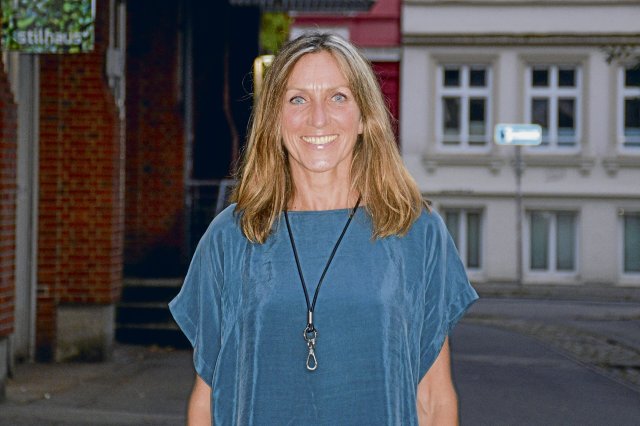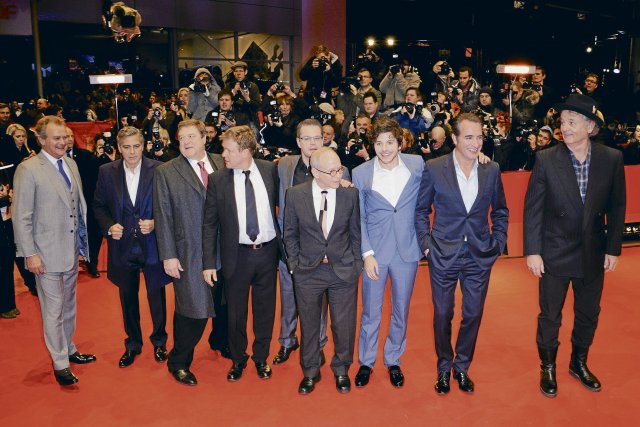Only men as far as the eye can see: Red carpet at the 2014 Berlinale, during which “Pro Quote Director” was founded.
Photo: IMAGO/ABACAPRESS/Marechal Aurore
An article by Ellen Wittstock in the magazine “Black Box” about the distribution of directing jobs between men and women in film and television led to a secret meeting of women at the Berlinale in 2014 to do something. How did you find out about it?
Through word of mouth. A director friend of mine, Nina Grosse, called me. For the first time, I sat in a huge room with only women present. There was a spirit of optimism. We quickly knew: There was something rotten in the state of Denmark! We have to do something to become more visible as female directors and fight for more gender equality in the film and television world. We founded “Pro Quote Director” and then the twelve of us developed a strategy, including a “Pro Quote Director” appeal. At the beginning, 40 women signed the appeal, but it quickly grew to 800. Other women from the film industry also showed solidarity with us, actresses like Iris Berben and Veronica Ferres signed our manifesto. It was a huge snowball that couldn’t be stopped.
How did you proceed?
We were guided by numbers. The figures from the diversity report of the Federal Association of Directors supported our analysis of the imbalance. Of 100 percent of paid fictional works in primetime television, only eleven percent were made by female directors. However, the average number of female graduates from German film schools was 40 percent. We confronted the broadcasters with our numbers. They reacted surprisingly openly and promised to change things. However, according to the diversity report, the quota on ARD and ZDF from 2013 to 2018 was 20 percent; for fictional programs on television the proportion was 30 percent between 2018 and 2019.
Interview

Connie Walther is a film director (including “Wie Feuer und Flamme”, “Zappelphilipp”, “My Parents’ Wedding”). She is a founding member of “Pro Quote Director” and a member of “Pro Quote Film”. On February 19th, “Pro Quote Film” invites you to the “Empowered for quality” congress at the Berlinale in the Berlin Museum for Communication.
Did you have an aha moment during the initiative?
When I heard the sentence “Women are allowed to make bad films” at the 2014 event, something clicked for me. Up until that moment, everything for me revolved around artistic standards; I hadn’t even considered the many “fast food formats” that set completely different priorities. “Quality before quota” is too simplistic, because one has very little to do with the other. Due to a difference, there are double standards here and talent and relevance are evaluated differently.
In your commercial, based on Ina Deter’s song “Women come slowly but powerfully,” three women ride through the picture. What did you want to say as a director?
Ina Deter was one of the few women who moved forward in pop music with feminist lyrics in the early 80s. For me, horses represent elegance, power and speed, i.e. everything that makes for impressive forward movement. A horse is a herd animal, not a solitary animal. I also staged the spot like a Western in slow motion because I wanted to repurpose the male connotation of the classic Western as feminine.
In 2017 you decided to change your name to »Pro Quote Film« decided and the pro-quota initiative was expanded to a total of nine trades. In hindsight, was that a good step?
It was a mandatory decision at the time. After all, this imbalance for women also existed in all other trades in the film industry. If you want to participate in society and strive for a broad change in consciousness, then it’s about more than particular interests. In terms of direction, I’m putting a big question mark behind the widening today. The broader a movement becomes, the less depth it goes into. Maybe we as directors didn’t have the foresight at that point to see how threatened our profession was. In many formats today, directing is set and production management. Everything has to be predictable and therefore calculable. From my point of view, it no longer has anything to do with what I once competed for. We as directors should have continued to fight for this in a more targeted manner. If the position of the director is weakened, most other positions also suffer.
nd.Kompakt – our daily newsletter
Our daily newsletter nd.Compact brings order to the news madness. Every day you will receive an overview of the most exciting stories from the world editorial staff. Get your free subscription here.
Isn’t it more difficult to fight for everyone at the same time and to take all sensitivities and groups into account?
Yes, that’s right. The impact is higher as a small, rebellious group. But: parcelling often leads to individual liberations that are individually important. Collectively, these separations often lead to the opposite of what is intended to be achieved. The uncertainty that we caused among the old white men back then was good. But now it has almost become a feeling of uncertainty across society as a whole.
Where are we today?
Pro Quote Film still demands a 50/50 ratio in front of and behind the camera. The initiative takes action against sexism and racism, against prejudices based on social origin, skin color, sexual orientation or prejudices based on physical limitations. We are a long way from parity. Age discrimination is an important issue that affects both men and women, demanding directors as well as serial craftsmen. If creative people are not only old, but also female, they have a very bad hand. The economic crisis that our industry is currently going through is hitting everyone who is disadvantaged many times harder.
What is your vision as a director??
Content, content, content. The narratives absolutely need to be opened up. We should ask ourselves: What is the meaning of stories for a society and which stories do we tell and with what intention? Do we continue to play war games in films and murder all the time so that we maintain our negative image of humanity? Are we just court jesters, or are we able to give impulses through something fictional that then have an impact on the reality of our lives, that create resonance spaces that… illuminate blind spots? If we don’t create a good, resilient community that can endure violent cinematic discourse in the struggle for something essential, then there will only be run-of-the-mill stories that are as empty of content as a damn bad pop song.
https://proquote-film.de
